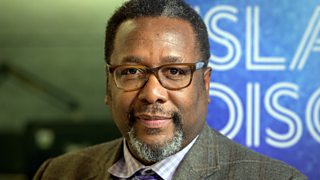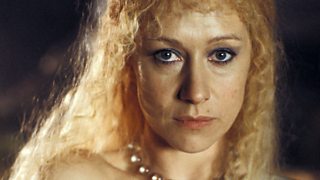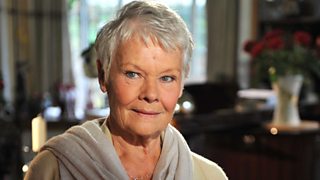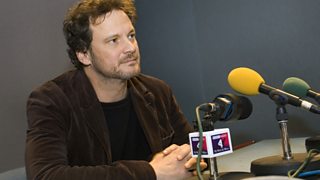Nine things we learned from Richard E. Grant's Desert Island Discs
Richard E. Grant was born as Richard Grant Esterhuysen in Eswatini when it was still called Swaziland. He moved to London and worked as a waiter while trying to launch his acting career. His big break came in 1987 with the title role in Withnail and I, and he’s appeared in a vast range of films since then. He was nominated for an Oscar in 2019 for his performance in the black comedy Can You Ever Forgive Me?, played Allegiant General Pryde in Star Wars and off-screen he is a lifelong diarist, publishing three successful collections of his writing. Here’s what we learned from his Desert Island Discs...
-
![]()
Listen to Richard E. Grant's Desert Island Discs
To hear new episodes with the full tracks first, listen on 91�ȱ� Sounds.

1. Richard is a lifelong Barbra Streisand super-fan
"I first saw her [on screen] when I was 12 years old in 1969,” says Richard explaining that he was drawn to her “because she had an unusual face - like Donald Sutherland had a very long face - and I'd seen both of them in a movie that same year. Everybody had said [to me]: ‘Hey, you can never be a professional actor and certainly not coming from Swaziland’, as it was then called.”
“So these are the two people that were my kind of lodestars. I thought: ‘Well if they can do it.’ And this [song] is such a cri de cœur of impassioned, wanting to be successful... It's the backstage rag to riches story of comedian Fanny Brice. I just thought that it encapsulated everything… and nobody else has ever sung it like she has.”
Richard’s first musical choice is from the soundtrack of the film Funny Girl and the track is I'm the Greatest Star sung by Barbra Streisand, who played Fanny Brice, first on Broadway and again in the 1968 film adaptation.
2. As a child he lived through the twilight years of the British Empire
Richard was born in 1957 in Swaziland, now Eswatini, one of the smallest countries in Africa, where his father worked for the British government administration. He still has strong memories of his early life there:
“It was a goldfish bowl in that it was hermetically sealed expat colonial life, of people who - in retrospect - were very self-important about their roles, in pith helmets. There was a very, very strict pecking order in the last gasp of empire - that's until independence came in 1968.”
3. Aged 10, Richard saw something he shouldn’t – and it changed his life
One childhood memory has never left him: “I inadvertently witnessed my mother bonking my father’s best friend on the front seat of a car late one evening. We were coming back from a cricket match and I was obviously asleep on the back seat and then woke up to the rhythmic movements of the car, which is something that you can well imagine!”
At the time, Richard struggled to understand the moment: “I tried God and got no response. I obviously couldn't tell my father or my mother or my friends, so I thought that to try and understand what had happened, I started keeping a diary. And it's continued to be something that I've done every day to try and make sense of the world that I live in.”
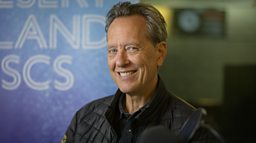
4. He now has a strong relationship with his mother – after many, many years apart
“She is 91,” says Richard, “And formidable: chain smokes, she drives herself, she plays bridge three times a week, she reads five books for a publisher that she does ad hoc work for, so she is a force of nature.”
I have a fantasy that Quentin Tarantino is going to cast me as a sort of sleazy lounge lizard Vegas singer
“We had a great estrangement for decades. And after I had psychoanalysis when I was 42 - after, kind of, a breakdown - I had this breakthrough with her in that I was guided by this psychoanalyst to try and get her to reveal her narrative of what had happened, to explain why she ended up in the front seat of the car, that thing that I mentioned.”
“I got a very, very detailed lengthy letter written with the voice of a young woman in the colonies, having a child and dealing with the pecking order, not allowed to work, and all those kind of restrictions... She said three words to me when we finally had a face to face after these letters had been exchanged - I went out to visit her - she said three magic words: ‘Please forgive me’. That instantly removed all these weights and pillars of prejudice and longstanding misunderstanding that we'd had between us. It was incredible. I now Skype her once a week.”
5. Richard’s father once almost killed him
Richard’s father Henrik was “an incredibly witty, fast thinking, dynamic person,” and had a senior role in the government, as head of education – but after Richard’s mother left him, everything changed. Henrik started drinking a bottle of whisky a day: “by nine o'clock at night, it was literally like a switch - he became a completely different character, very morose, very angry and often very violent.”
Richard recalls how he tried to curb his father’s behaviour:
“When I was 15 I naively thought that if I emptied all 12 bottles of Scotch down the sink that he would somehow stop drinking. I was on the 11th bottle and felt something very cold on the back of my head and it was a gun. I ducked and ran into the garden and then he chased me and flicked on the garden lights - and there were pool lights as well - and he found me and then got hold of me and said, ‘I'm going to blow your brains out,’ and I said, ‘Go ahead and do it! Just let's get this over and done with.’”
“He missed because he was so drunk and then I ran away from home for a couple of weeks. But having said that, my memory of him is so much more than remembering that part of him, because I knew that was something that was entirely brought about by addiction, rather than the man that I absolutely worshipped and loved.”
6. There are still roles that he’d love to play
“I have a fantasy that Quentin Tarantino is going to cast me as a sort of sleazy lounge lizard Vegas singer, but that has never come to pass, but that is what I would like - and to be in a western!”
7. He did a deal to get cut-price voice classes – and it paid off
When Richard moved to London, trying to find work as an actor, he was told that he sounded like someone from the 1950s, so he decided to “iron out [his] colonial accent.”
He attended voice classes with “a very feisty, spike-haired, boiler-suited woman called Joan Washington.” Richard decided to ask her for individual lessons, but Joan said she was very busy:
“And I said, ‘Please, I beg of you,’ and she laughed. I got down on my knees and she said, ‘Oh get up for God’s sake,’ and I said, ‘How much is it going to cost?’ And she said, ‘£20 an hour,’ and I said, ‘Oh, I can only really afford £12 because I'm paying £30 a week for my bedsit and I'm a waiter,’ and she said, ‘Oh OK, we'll do a deal: you can have some lessons on the proviso that you pay me back if you ever make it.’ So she did get paid back, indeed!”
Richard and Joan got married in 1986, and the following year Richard’s career took off. Joan died last year, after a diagnosis of lung cancer.

8. Richard’s lifelong diary-keeping proved vital after his wife’s terminal diagnosis
“By keeping a detailed diary of what happened on a daily basis, I thought, ‘Well, I have no control over any of this and I know that she's terminally ill’, but I wanted as detailed a record of the time that we had left together, so that I would always have something that I could re-read or go back to.”
It’s a battle cry for anybody who has been told, ‘No, you can't’ in your career
Richard drew on his diaries to publish an acclaimed memoir of his years with Joan earlier this year.
9. His eighth and final Desert Island Disc takes him back to Barbra
Richard chooses Barbra Streisand’s renowned recording of Don’t Rain On My Parade, from Funny Girl, because he loves its inspirational message: “It’s a battle cry for anybody who has been told, ‘No, you can't’ in your career… it's really the motor that I think any actor can identify with. When you're told ‘no’, keep going and keep trying! Her interpretation is absolutely extraordinary - as is the final note.”

More Desert Island Discs
-
![]()
Wendell Pierce
The actor shares his castaway musical choices.
-
![]()
The academy award-winning actress spoke to Roy Plomley in 1982.
-
![]()
The Oscar-winning actress was Kirsty Young's castaway in 2015.
-
![]()
The multii-award-winning actor was interviewed by Sue Lawley in 2005.

